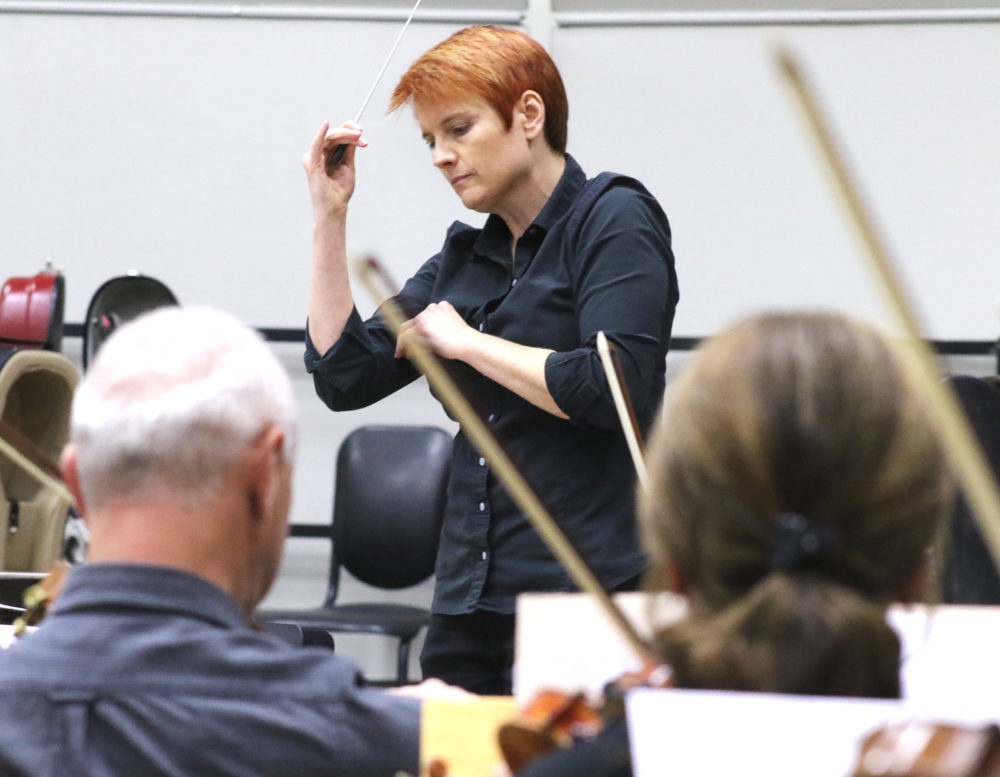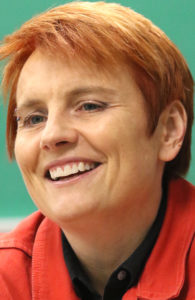WATSON TO LEAD CSO SATURDAY
2nd Conductor’s Concert
Uses Spinoffs From Bach

By LIBBY CUDMORE • Special to www.AllOTSEGO.com

ONEONTA – Carolyn Watson knows that among conductors, it’s a small world.
“My conducting professor at the University of Sydney was Imre Palló,” she said. “He was the music director of the Hudson Valley Philharmonic, so when I saw the Catskill Symphony Orchestra, I wondered if it was near where he used to be. And it was!”
Watson, the second of the three finalists seeking appointment as Catskill Symphony Orchestra conductor, is planning a concert at 7:30 p.m. Saturday in SUNY’s Hunt Union Ballroom that includes spinoffs from J.S. Bach’s “Ciacona for Solo Violin, BVW 1004, no. 5,” with Michael Emery, CSO concertmaster, playing the violin solo.
Xavier Montsalvatge’s “Desintegracion Morfologica de la Chacona de J.S. Bach”, for example, is a breakdown of the Bach piece, while Johannes Brahms’ “Symphony No. 4 in E minor, Op. 98,” utilizes elements of Bach’s “Nach dir, Herr, verlanget mich BWV 150.”
“The elements of a piece are rhythm, melody and form,” she explained. “Each of these pieces highlight that, and the form puts everything together.”
The concert is entitled “The Elements,” and includes Jennifer Higdon’s “Fanfare Ritmico” and Gabriel Fauré’s “Pavane for Orchestra.”
“I hope this appeals to the orchestra and the audience,” Watson said in an interview. “I’m guessing the Fanfare and the Montsalvatge will be much less familiar – it’s easy to trot out the same works that audiences like hearing, but I wanted to bring in some variety. It shows the kind of conductor I would be.”
She also chose the Higdon piece to highlight female composers. “I looked through the last several years of programs and they were all male composers,” she said.
Growing up just outside of Sydney, Australia, both Watson and her brother, Matthew, played violin from a very young age. “My mother played a little piano, but she always wanted to play the violin and wasn’t able,” she said. “So she would play us all these records, like Tchaikovsky.”
Matthew now plays for the BBC orchestra. “I came into conducting by accident,” she said. “I was teaching in Sydney, and more often than not, I found myself in front of groups of students.”
Interested to learn more about conducting, she enrolled at the American Academy of Conducting in Aspen, Colo., in 2007. “It really opened my eyes,” she said. “I quit teaching, and freelanced around Europe for a few years.”
She conducted the Brandenburg Symphony, the BBC Concert Orchestra, The St. Petersburg Chamber Philharmonic and others before moving to the United States in 2013 to teach at the Interlochen Center for the Arts in Michigan. She has also conducted the Lyric Opera in Kansas City, the Austin Symphony, the San Antonio Symphony and the Detroit symphony Civic Orchestra.
“I like being the center of attention!” she joked. “But really, I enjoy the artistic responsibility. I love the rehearsal process, and I like working with people.”
“There’s so much more to conducting than just gestures,” she continued. “It’s about feeling the vibe in the room, the subtle, non-verbal communication. The orchestra is able to read things from me.”
Now University of Kansas’ director of Orchestral Studies, she has returned to her educational background, coordinating interdisciplinary programs across campus.
“I just did a production with the campus counseling and psychiatric services to promote mental health,” she said. “The program included pieces by Robert Schumann and Bohuslav Jan Martinů, who both famously struggled with mental health issues.”
She hopes that, if chosen as the CSO’s musical director, she can continue similar programs in Oneonta. “I want to connect the orchestra more broadly with aspects of the community,” she said.
And since starting at Kansas, she realized that she is also in the same town as Silas Huff, who is also in the running for the conductor position. “He came to see the most recent performance I had,” she said. “We were going to meet for lunch this week, but I had to come here!”

